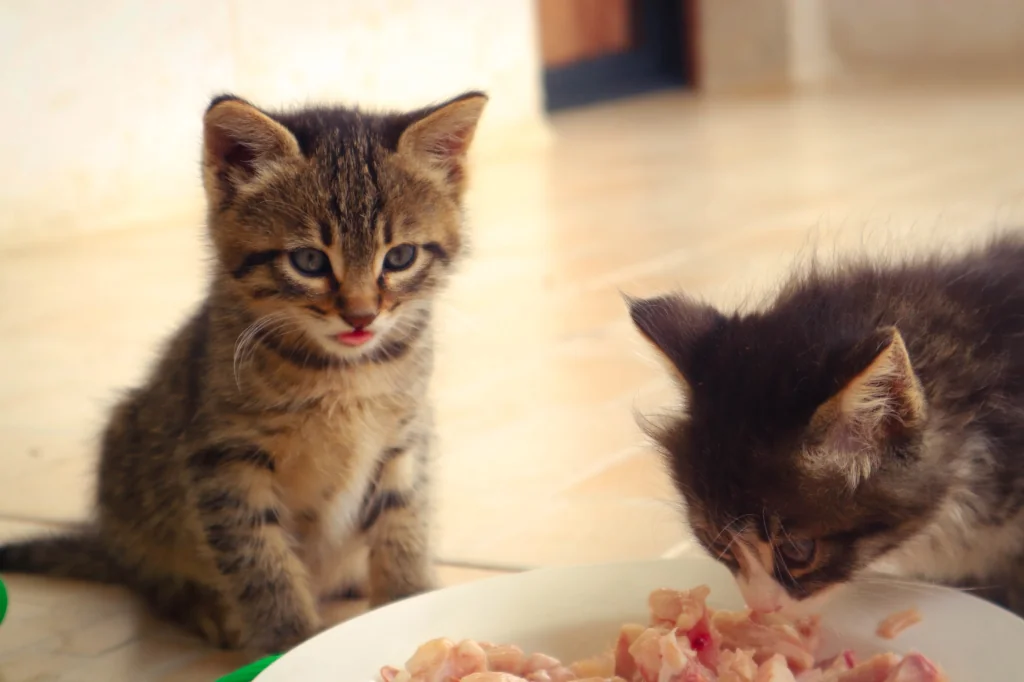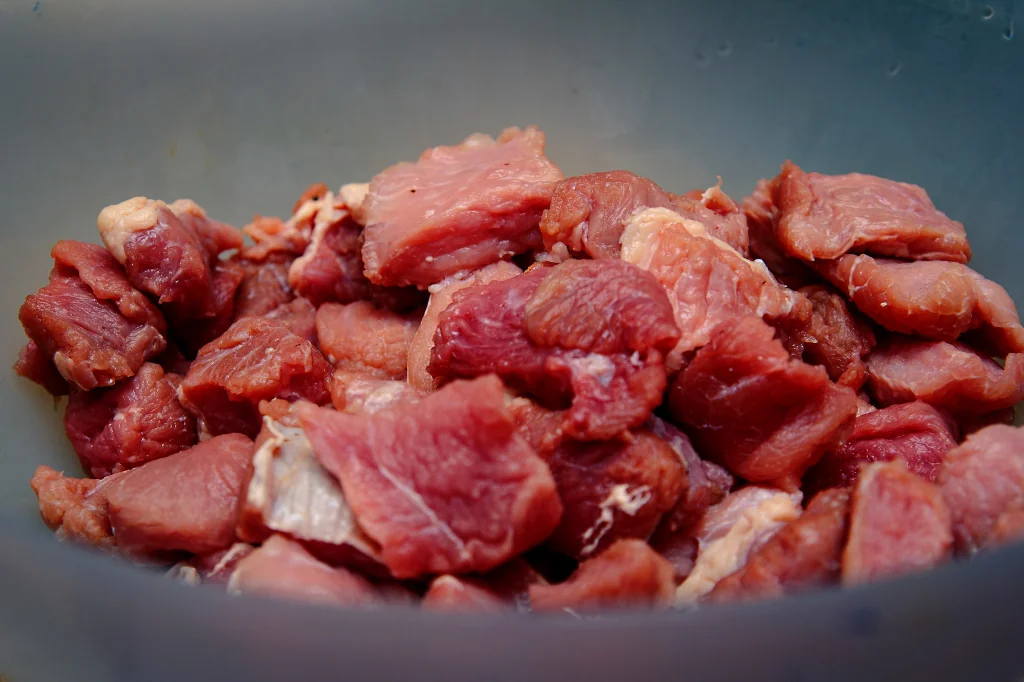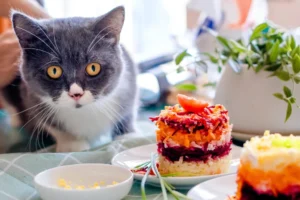Disclosure: We may earn a commission from helpful, relevant links in our content. No cost to you. See our privacy policy.
Ever wondered if your fluffy feline could swap their usual mealtime fare for a tantalizing plate of raw food? It’s a big question that’s gnawing at the minds of countless cat parents today.
In the US, about 3 to 4% of cat owners buy raw cat foods, but how safe is this diet? And what are the benefits?
The world of cat nutrition can seem as complicated as a tangled ball of yarn, and figuring out the best diet for your cat can be an even trickier proposition. Our mission? To navigate this maze, turning your cat food conundrums into clear, bite-sized answers.
Together, let’s explore the potential benefits and risks of raw food diets for your whiskered friend and get you closer to knowing what’s truly the cat’s meow in their dietary world.

Can a Raw Food Diet Be Good for Your Cat?
Raw food diets for cats, often referred to as Biologically Appropriate Raw Food (BARF), are designed to mimic what felines might eat in the wild.
Proponents argue that such diets can keep your cat closer to their natural eating habits, and potentially offer some health benefits.
Sure, the idea of your beloved pet crunching on a raw mouse might make you wince, but remember, domestic cats descended from wild ancestors with specific dietary needs. In essence, a raw food diet might align more closely with a cat’s instinctual feeding habits. And this, some believe, could potentially lead to better health.
However, that doesn’t mean you should rush out to replace the canned food with raw chicken just yet. While the theory behind a raw food diet is intriguing, it’s crucial to understand the potential benefits and risks (there are many).
Keep your whiskers twitching, as we dive deeper into the specifics of raw food diets for cats.
What Benefits Could a Raw Diet Offer to Cats?
Eager to unravel the potential pros of feeding your cat a raw diet? Let’s dive deep and explore how this diet shift can influence your feline’s health and wellbeing.
Better Digestion
One notable benefit of a raw food diet for cats could be improved digestion. Cats have evolved as obligate carnivores, which means their digestive systems are specially designed to break down meat more efficiently.
Raw meat can be easier for cats to digest compared to some processed foods. This could result in less bloating and a general improvement in their digestive health.
Dental Health
Raw diets can potentially support better dental health in cats. Chewing on raw meat can act as a natural toothbrush, helping to scrape off plaque and tartar. If done right, it might even save a few dreaded trips to the vet for dental cleaning!
Weight Control
Cats on raw diets often consume fewer carbs and more protein, aligning more closely with their natural dietary needs. This balance could potentially help in managing a healthy weight.
Remember, obesity can be a big concern in our feline friends, contributing to a host of health issues, so anything that can assist with weight management is worth considering.
Shinier Coat
Ever noticed how wild cats boast beautifully sleek, shiny coats? A diet high in quality proteins can contribute to the health of your cat’s skin and fur. So, a switch to raw might just give your feline friend an envy-worthy, glossy coat.
Reduced Allergy Symptoms
Some cats develop allergies or sensitivities to ingredients commonly found in commercial cat food. A raw diet, made up of fresh, natural ingredients, might potentially help alleviate such allergy symptoms, leading to a more comfortable and itch-free existence for your feline companion.
While these benefits can seem appealing, it’s important to remember that individual responses to diet changes can vary. While one cat might thrive on a raw food diet, another might not. Therefore, understanding the potential risks, which we’ll explore in the next section, is equally crucial before making a switch.
What Are the Risks Involved in Feeding Cats a Raw Diet?
Considering the raw diet for your cat? Hold on. It’s crucial to assess the cons too. In this section, we examine the potential risks associated with this dietary change.
Nutritional Imbalances
One of the biggest concerns with a raw diet is the risk of nutritional imbalances. While it’s true that raw diets aim to mimic what cats might eat in the wild, achieving the right balance of nutrients at home can be a tricky proposition.
There’s a risk that homemade raw diets, if not correctly formulated, could lack essential nutrients or provide them in incorrect proportions, leading to health issues over time.
To help ensure nutritional balance in your cat’s raw diet, supplements like L-Lysine are a great addition. It’s formulated with Lysine, an essential amino acid, which supports your cat’s immune health.
Bacterial Contamination
Raw meat, whether it’s for human or feline consumption, carries a risk of bacterial contamination. Pathogens like Salmonella or E.coli can lurk in raw meat and cause foodborne illnesses. Current studies concluded that it’s best not to advise pet owners to feed their cats raw food due to short and long-term potential health problems.
And it’s not just your cat that’s at risk – humans in the household could also be exposed to these pathogens through handling the raw food or coming into contact with the cat’s feces.
When it comes to handling and preparing raw food, consider investing in ThermoPro TP03 Meat Thermometer. This tool can ensure the meat is stored and thawed at safe temperatures, reducing the risk of bacterial growth.
Bone Injuries
While chewing on raw bones can be beneficial for a cat’s dental health, it comes with a significant risk. Small, sharp bone fragments can potentially lead to mouth injuries, or worse, cause intestinal blockage if swallowed.
Difficulty in Transition
Some cats may find the transition from commercial food to a raw diet challenging. They may initially refuse to eat the unfamiliar food, potentially leading to weight loss and other health issues. Plus, some cats may have underlying health conditions that could be exacerbated by a raw diet.
Time and Cost
Preparing a balanced raw diet for your cat can be time-consuming and expensive, particularly if you’re using high-quality meats and supplements. This could add to household stress and may not be feasible for everyone.
It’s clear that while raw diets might offer certain benefits, they’re not without their risks. This is why it’s crucial to have an open discussion with your vet before deciding to switch your cat to a raw diet. They can provide individualized advice, considering your cat’s specific needs and circumstances.

What Vets and Health Organizations Say About Raw Cat Diets
While some veterinarians might support the idea of raw diets, the majority, including organizations like the American Veterinary Medical Association and the American Animal Hospital Association, express concerns about them. A major concern revolves around the health risks associated with raw diets.
A study published by the AVMA highlighted potential issues ranging from increased colonic fermentation and gas production due to higher protein intakes to more severe life-threatening concerns like bacterial and parasitic contamination. This contamination risk is not only a threat to our beloved pets but can also pose a significant risk to humans, especially those who are young, elderly, or have a compromised immune system.
While pets might readily consume raw meat-based diets (RMBDs) and sometimes not develop any immediate health problems, the long-term effects are still uncertain, and in some instances, potentially hazardous.
The AVMA study further points out that even if the RMBDs are formulated to meet specific nutrient guidelines, there’s often a lack of quality control during their production, posing another risk for the introduction of pathogens into households.
On the other hand, the AAHA has issued a statement that they do not advocate or endorse feeding pets any raw or dehydrated nonsterilized foods, including treats of animal origin, due to the overwhelming scientific evidence showing the potential health risks. These include not just the pets consuming the diet, but also other animals and humans that may come into contact with these pets or their feces.
Given the evidence and concerns voiced by leading veterinary bodies, one should exercise informed caution about raw diets for cats. Vets stress the potential for bacterial contamination, nutritional imbalance, and bone injuries. Therefore, before considering a raw diet, it’s crucial to consult your vet for tailored advice.
What to Consider Before Switching Your Cat to a Raw Diet?
If you’re contemplating a raw diet for your feline companion, here are a few key factors to keep in mind:
- Consult Your Vet. Before making any changes to your cat’s diet, always consult with a veterinarian. They can provide guidance on whether a raw diet is suitable for your cat, considering their age, health status, and nutritional needs.
- Nutritional Balance. Make sure the raw diet includes all the necessary nutrients for your cat. This might require adding certain supplements to ensure your cat gets everything they need.
- Food Safety. Be aware of food safety practices to prevent bacterial contamination. This includes proper storage, preparation, and cleaning measures.
- Cost and Time. Consider whether you have the time and resources to commit to a raw diet. It often requires more preparation and can be more expensive than commercial cat food.
- Monitoring. Keep a close eye on your cat during the transition period and afterward. Look out for changes in their behavior, weight, coat condition, and general health.
FAQs
Is it OK for cats to eat raw food?
Leading veterinary organizations advise against feeding your cat raw foods due to potential risks associated with it. Generally, while cats can eat raw food, it’s important to ensure the food is safe, nutritionally balanced, and suitable for your specific cat’s needs.
Is raw diet good for cats?
A raw diet can be good for some cats, but it’s not ideal for all, plus it carries potential health risks. Factors such as a cat’s age, health status, sterilization of the raw food, and specific nutritional needs should be considered.
Can I feed my cat raw meat occasionally?
Feeding your cat raw meat occasionally is possible, but it’s important to remember that occasional raw meat does not constitute a balanced diet and should not replace regular meals.
What about raw fish, can cats eat that too?
While cats can eat raw fish, it should be given sparingly and always under supervision, as some fish can contain parasites or high levels of heavy metals, which can be harmful to cats.
Alex, a passionate animal lover, has experience in training and understanding animal behavior. As a proud pet parent to two dogs and three cats, he founded AnimalReport.net to share insights from animal experts and expand his knowledge of the animal kingdom.




